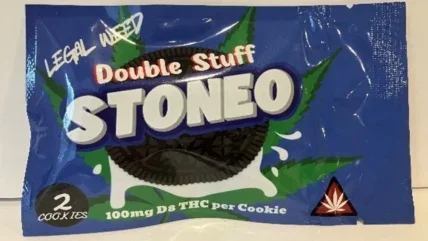
Today, the U.S. Food and Drug Administration and the Federal Trade Commission (FTC) issued warning letters to five companies for illegally selling copycat food products containing delta-8 THC and introducing them into the marketplace in violation of the Federal Food, Drug, and Cosmetic Act (FD&C Act). The warning letters were issued to: Hippy Mood, Earthly Hemps, Shamrockshrooms.com, Mary Janes Bakery Co. LLC and Life Leaf Medical CBD Center. The FDA also issued a warning letter independently to the company GrowGod for the same FD&C Act violations.
These warnings serve as part of the FDA and FTC’s ongoing joint effort to take action against companies selling illegal copycat food products containing delta-8 THC. In July 2023, the two agencies worked together to warn six other companies for selling edible food products containing delta-8 THC in packaging that could easily be confused for foods sold by popular national brands. All six of those companies no longer have such products in stock.
“Inadequate or confusing labeling can result in children or unsuspecting adults consuming products with strong resemblance to popular snacks and candies that contain delta-8 THC without realizing it,” said FDA Principal Deputy Commissioner Namandjé Bumpus, Ph.D. “As accidental ingestion and/or overconsumption of delta-8 THC containing products could pose considerable health risks, the companies who sell these illegal products are demonstrating complete neglect for consumer safety. The FDA will continue to work to safeguard the health and safety of U.S. consumers by monitoring the marketplace and taking action when companies sell products that present a threat to public health.”
In June 2022, the FDA warned consumers about children accidentally ingesting food products containing delta-8 THC. From Jan. 1, 2021, to Dec. 31, 2023, the FDA received over 300 adverse event reports involving children and adults who consumed delta-8 THC products. Nearly half of these reports involved hospitalization or emergency department visits, and approximately two-thirds of these adverse events followed ingestion of delta-8 THC-containing food products such as candy or brownies. Adverse events included, but were not limited to, hallucinations, vomiting, tremor, anxiety, dizziness, confusion, and loss of consciousness.
Copycat food products containing delta-8 THC are particularly concerning to the FDA as they are extremely easy to purchase and are often available to youth. The FDA is also concerned about the processes used to synthesize delta-8 THC, as impurities or variations in the composition process can result in products that may be harmful or have unpredictable effects on consumers.
In addition, packaging that is almost indistinguishable from many popular snacks can be confusing for consumers. Several of the companies warned today illegally sell copycat food products containing delta-8 THC, including chips, cookies, gummies or other snacks that mimic well-known snack food brands by using similar brand names, logos, or pictures on packaging that consumers, especially children, may confuse with traditional foods. See below:
“Companies that market and sell edible THC products that are easily mistaken for snacks and candy are not only acting illegally, but they are also putting the health of young children at risk,” said Samuel Levine, director of the FTC’s Bureau of Consumer Protection. “Those that prioritize profits in front of children’s safety are at serious risk of legal action.”
The FDA encourages health care providers and consumers to report adverse reactions associated with FDA-regulated products to the agency using MedWatch or the Safety Reporting Portal.
The FDA has requested written responses from the companies within 15 working days stating how they will address these violations and prevent their recurrence. Failure to promptly address the violations may result in legal action, including product seizure and/or injunction.






